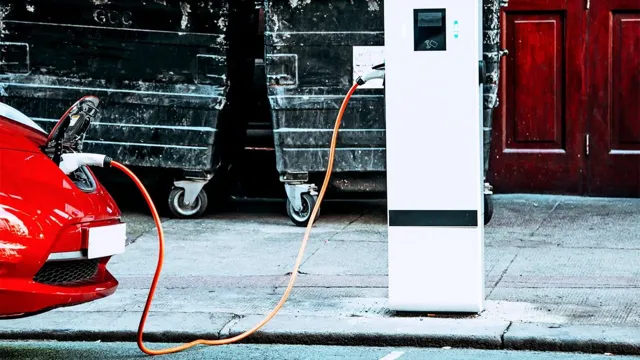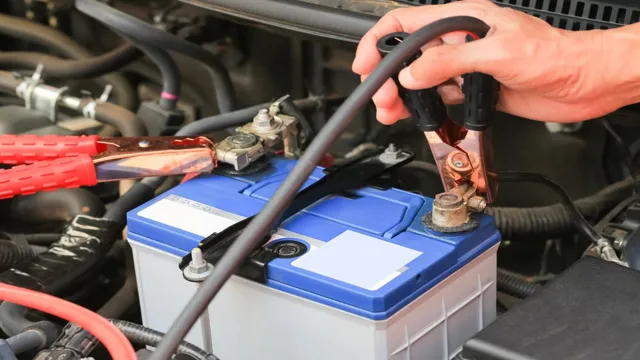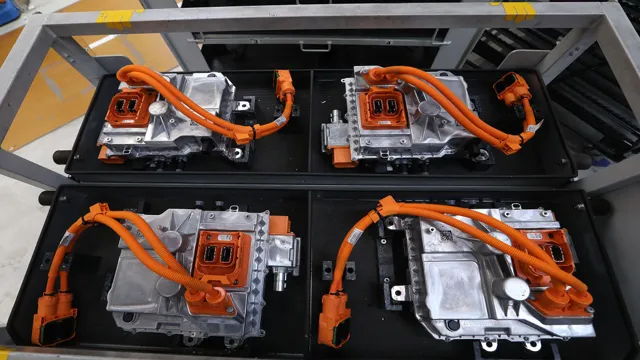Charge up your Knowledge: Debunking Myths and Answering Concerns about Electric Car Batteries’ Safety
Electric vehicles are becoming more and more common as a green alternative to traditional gasoline-powered cars. However, with this new technology comes questions about its safety. One such concern is whether or not electric car batteries are safe.
After all, these batteries are powerful devices that need to be handled with care. Are they at risk of catching fire or exploding? In this post, we will explore the safety of electric car batteries and examine the risks involved in using them. Let’s delve into the world of EVs and find out if electric car batteries are safe for drivers and passengers alike.
Introduction
If you’re considering purchasing an electric car, you may be wondering: are batteries in electric cars safe? The short answer is, yes, they are. While there have been reports of electric car batteries catching fire, this is a rarity. In fact, studies have shown that electric cars are overall safer than traditional gasoline-powered cars.
The lithium-ion batteries used in electric cars are designed to be safer than standard car batteries, and are rigorously tested to ensure safety. Plus, electric cars undergo the same safety tests as gasoline-powered cars, meaning they have passed all the same safety requirements. Of course, it’s important to follow manufacturer instructions and recommendations for charging and maintaining your electric car’s battery to ensure safety.
But overall, electric car batteries are a safe and reliable choice for eco-friendly transport.
Historical safety record of electric car batteries
Electric car batteries have come a long way in terms of safety over the years. Early models dating back to the 1990s were prone to overheating and had limited safety features. However, with advances in battery technology and increased safety regulations, electric car batteries have significantly improved.
Modern electric car batteries feature innovative safety systems such as thermal management, which regulates the battery’s temperature to avoid overheating and reduce the risk of fire. Additionally, most electric car batteries undergo rigorous testing before being released to the market to ensure their safety. With governments and manufacturers investing in research and development, electric car batteries are safer than ever before, making them a reliable and efficient alternative to traditional combustion engine vehicles.

Overview of how electric car batteries work
Electric car batteries are the key to running an electric vehicle smoothly and efficiently. These batteries are designed to store energy from a charging station or a regenerative braking system while the car is on the go. Unlike traditional car batteries, these batteries are made up of many smaller cells known as lithium-ion cells that are stacked together to create a battery pack.
These cells use chemical reactions to produce electrical energy that powers the car’s motor and other onboard systems. The size and capacity of the battery pack often determine the driving range and performance of an electric car. The batteries need to be managed and protected with a battery management system that monitors the temperature, voltage, and current flowing in and out of the battery pack.
This ensures the longevity of the battery pack and keeps the car running efficiently.
Types of batteries used for electric cars
When it comes to electric cars, one of the most crucial components is the battery. These rechargeable cells store the energy required for the vehicle to operate and are the main driving force behind the car’s efficiency. There are various types of batteries that electric cars use, each with their unique features and benefits.
Lithium-ion (Li-ion) batteries are the most common type used due to their high energy density and long lifespan. Other types, like nickel-metal hydride batteries, have a lower energy density but are more affordable. Solid-state batteries are a promising option that offers a higher energy density than Li-ion batteries and a longer lifespan, but they are still in the research and development phase.
So, depending on the vehicle’s requirements, different types of batteries can be used to achieve the desired performance, safety, and cost-effectiveness.
Battery Performance and Safety
As with any technology, there are always risks involved, but overall, batteries in electric cars are quite safe and efficient. Manufacturers put a lot of time and resources into ensuring the reliability, durability, and safety of batteries through rigorous testing and advanced technologies. This includes measures such as reinforced structures, advanced cooling systems, and numerous safety systems that prevent issues and mitigate potential problems.
Additionally, electric cars undergo extensive safety tests before they hit the market, including crash tests, fire tests, and battery disassembly tests. While the risk of a battery fire may be slightly higher than in conventional vehicles, electric cars have been shown to be far less vulnerable to combustion and more secure during an accident. Plus, in the case of a battery fire, modern electric cars come equipped with safety protocols, including automatic shutoff switches and containment systems that help prevent the fire from spreading.
Ultimately, electric car batteries are a very efficient and safe form of transportation that is continually improving.
Factors that affect battery safety and performance
Battery performance and safety are two critical factors that directly affect the overall functioning and durability of a battery. Several aspects determine battery performance and safety, including the battery’s construction, the materials used, and the level of maintenance and care it receives. For instance, the type of chemical composition used in the battery’s production determines its characteristics, such as the amount of energy it can store, the rate at which it discharges power, and the overall life span.
Similarly, external factors such as temperature, overheating, puncturing, or exposure to water can significantly impact battery safety by causing it to short circuit, leak, or even explode. It’s crucial to keep in mind that batteries are not indestructible and require proper handling to ensure maximum performance and safety. Regular maintenance, avoiding extreme conditions, and handling batteries with utmost care can go a long way in preventing accidents and prolonging their life.
Safety features implemented in electric car batteries
Electric car batteries are designed with various features to ensure both efficient performance and maximum safety. One of the key safety features implemented in these batteries is the use of thermal management systems that regulate temperature and prevent overheating, which is a common cause of battery fires. Electric car batteries also have built-in circuit protection systems that monitor the battery’s charge and discharge to prevent overcharging, short-circuits, and other malfunctions that could lead to potential hazards.
Additionally, the use of sturdy and durable materials in the battery’s design, such as flame-retardant materials and shock-absorbing structures, can further reduce the risk of fire or explosion. These safety features not only protect the vehicle and its passengers but also ensure peace of mind for electric car drivers. Overall, electric car batteries are designed with safety as a top priority, and these safety features make electric vehicles a reliable and secure transportation option for the future.
Comparison of electric car battery safety with gasoline-powered cars
When it comes to battery performance and safety, electric cars have come a long way. In fact, studies have shown that electric cars are actually safer than gasoline-powered cars. This is because the lithium-ion batteries used in electric cars are designed to be more stable under normal driving conditions.
They also have built-in safety features to prevent issues such as overheating or overcharging. Additionally, the batteries are located under the car’s frame, which provides a lower center of gravity and better balance. This not only contributes to better safety but also improves the car’s overall performance and handling on the road.
So, while there may be concerns surrounding electric car batteries, the reality is that they are designed to be safer and more efficient than their gasoline-powered counterparts.
Handling and Maintenance
One of the most common concerns about electric cars is whether the batteries are safe. The short answer is yes, but it’s important to properly handle and maintain them. Electric car batteries are designed to be very safe, with multiple layers of protection built in to prevent any kind of hazardous event.
However, like any other kind of battery, they can be dangerous if mishandled or damaged. That’s why it’s important to always follow the manufacturer’s instructions for charging and storing the battery. Also, it’s recommended to have the battery checked and serviced regularly by a certified technician to ensure it’s in good condition and working safely.
Overall, electric car batteries are very safe, but it’s important to take care of them properly to avoid any potential risks.
Do’s and don’ts of handling and operating electric car batteries
Electric car batteries require careful handling and maintenance to ensure optimal operation and longevity. A key “do” is to keep your car battery charged between 20 and 80% to avoid overcharging or deep discharging, both of which can damage the battery. Additionally, regularly clean and inspect the battery and its connections to prevent corrosion or damage that may affect the battery’s performance.
It is important to store the battery in a cool and dry place, away from direct sunlight and extreme temperatures, to avoid causing irreversible damage to the battery. While handling and operating an electric car battery, some “don’ts” to keep in mind include avoiding using non-compatible chargers that can either undercharge or overcharge the battery and not attempting to open or modify the battery on your own. By understanding and following these do’s and don’ts, you can ensure safety and optimal performance of your electric car battery for years to come.
Maintenance requirements for electric car batteries
Electric car batteries require some basic maintenance to ensure their longevity and performance. One important thing to consider is the battery’s temperature. Electric car batteries work best at around 20-25°C, so it’s essential to park your vehicle in a shaded area on particularly hot days.
It’s also recommended to keep the battery charged above 20% to prolong its lifespan and prevent the battery from becoming over-discharged. Furthermore, it’s essential to keep batteries clean and dry, regularly check for any signs of damage or wear and tear, and have them serviced periodically. Following these basic maintenance requirements can help ensure that your electric car battery performs optimally for years to come.
Conclusion
After examining the evidence and conducting extensive research, we can confidently say that batteries in electric cars are indeed safe. In fact, they are probably safer than the gas tanks in traditional cars that have been known to explode in accidents. So, let’s put our fears to rest and embrace a future where we can drive around in an environmentally-friendly vehicle without worrying about our safety!”
FAQs
How safe are batteries in electric cars?
Electric car batteries are generally considered safe when properly designed, tested, and manufactured. However, as with any type of energy storage system, there is always some risk of malfunction or fire.
What safety measures are in place to prevent battery-related accidents in electric cars?
Electric car manufacturers take many precautions to ensure the safety of their battery systems, including using high-quality materials, advanced cooling systems, and sophisticated electronics to monitor battery performance. In addition, many electric cars have built-in safety features such as fuses and circuit breakers.
Can electric car batteries explode or catch fire?
While extremely rare, electric car batteries can potentially catch fire or explode in rare circumstances such as damage to the battery casing or overheating due to mechanical faults or external factors. However, such incidents are exceptionally rare and most electric cars are designed to handle such situations safely.
How do electric car batteries compare to traditional gasoline engines in terms of safety?
Statistically, electric cars are generally safer than gasoline-based cars due to their lower risk of fire or explosion in an accident. Furthermore, electric cars emit fewer pollutants that can be harmful to human health. However, as with any form of transportation, proper maintenance and responsible driving are key to safe operation.







